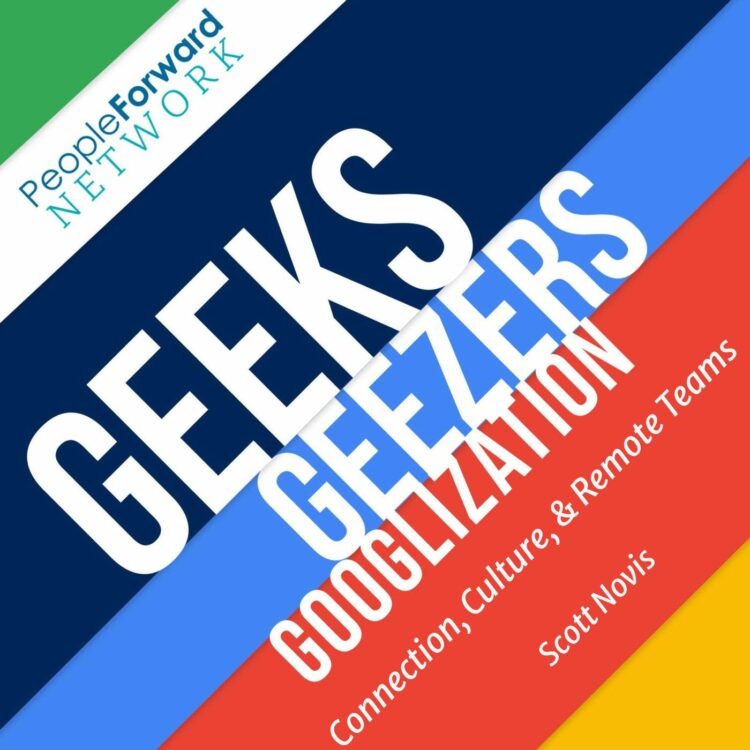Build Connection, Culture, Communication and Retention in Remote Teams with Scott Novis

In This Episode
If you love video games, then you’ll love this episode! But even if videos and gamings aren’t your things, you’ll want to continue reading and listening.
The past few years have been tough. Millions of workers now find it more difficult than ever to concentrate at work. With increased work stress, perpetual change, rising inflation, and distractions galore, it’s often hard to keep employees engaged and productive. Add to that the indecisive and erratic approach to remote and hybrid work, it’s no wonder workers are stressing and burning out. That’s where gaming and video come in.
Who Is Scott Novis?
Scott Novis is a gaming pro and he’s speaking with us today about how it video gaming can be intentional. He shares how we can avoid loneliness and detachment when working remotely using gaming. It’s all about having fun, collaborating, connecting, and communicating with each other in an effective way!
Scott has led an exciting career in the gaming industry and even worked for Disney, so he definitely has a lot to offer when it comes to Building Connection, Communication, and Retention in Remote Teams: “People engage more when things are fun.” Along the way, Scott secured two Engineering degrees and spent decades as a Video Game Executive at Disney and Pixar
Executive, as well as founded “Game Truck,” a nationwide franchise company that provides social gaming spaces for children and work environments.
Avoid These Remote Work Mistakes
There is no question that moving from going to work to working remotely has traveled a rocky road. But now that workers got a taste of working from home and had time to figure out how to do it better, they are not quite ready to turn the clock and experience long commutes, travel, and non-productive business meetings. But that doesn’t mean that remote work isn’t without its challenges.
Scott points out that when we work together in an office, there is a sense of synchronization. Unstructured, unplanned conversations erupt in side conversations, while passing co-workers, and in the lunch room. We lose the social cues when everyone is working in a different location.
Unfortunately, a lot of managers blame the loss of employee engagement and socialization on remote work when it is the managers themselves who are responsible. They point fingers at the dehumanization of communication through screens but they are just as responsible, if not more. It’s a manager’s “inability to manage remote work” too. It’s not that engagement and productivity aren’t possible when working remotely. It’s just different. It requires a different management approach. It requires different behaviors. It requires different tools. Scott believes it is gaming that could help transform these asynchronous, sometimes lonely, remote workplaces into highly interactive, engaging places to work.
Why Video Games?
Video games may not be something that you think about when talking about work, but they should be. Work shouldn’t be 100% transactional, says Scott Novis.
One reason that video games work is because you can’t “fake play.” Gaming affects our pre-frontal cortex and allows us to let our guard down—leading to an overall better work environment for teams! Neurocircuitry studies show our brains benefit by play in that it “teaches us to learn and not be overwhelmed by failure.”
Even Albert Einstein recognized its importance:,” If you’re not making mistakes, you’re not doing anything new.” Once we understand this, we only need to ask: where do we go from here, personally and professionally?
Gaming helps us identify what each of our unique skills is—to get the job done.
Dangers of Too Much Competition
The Default relationship in corporate America is competition, which is the antithesis of vulnerability. Over time, competition results in a loss of creativity, cognitive ability, and resiliency as people slip into a fixed mindset.
Western culture, and especially U.S. self-talk, Scott suggests, promote these limiting behaviors:
“I will be accepted when I prove my work.”
“What you do is who you are.”
“Who are you if you don’t know what to do and you’re not sure if you can do it?”
Scott encourages people not to react in a “flight or fight response.” Rather, take a deep breath and calm down—to re-focus.
You need to remember to have fun, whether you’re in a remote or hybrid workplace!
Where did you learn to be on a team?
By eleven years old, most children have fallen out of team sports and they’re never really on a team again until they go to work,” according to Scott. Consequently, we need to re-focus on socialization and communication working together.
Scott shares how video gaming is an amazing technology platform that has been created and can be used to help us in our professional lives. It’s a cost-effective way to help promote productivity in your company: “Video games literally work that is engineered that people will pay to do because they perceive it as play!”
When you think about it like that, it kind of all ties in! A lot of these games are very strategic and the mind has to work hard to get through— which of course uses a lot of the skills popular for a workplace atmosphere. We can talk to a video game player as if they’re a project manager—like it’s their job. It’s a modern way of connecting!
Meeting Human Needs in a Remote Workplace
Humans have a natural internal need to be:
- Seen
- Heard
- Known
- Accepted
To meet these needs, we need a sense of “Psychological Safety, ” an umbrella that protects us when we don’t know but can learn. In the workplace today, it’s about shifting our culture to one where we can learn together, which is why play is so important.”
A psychologically safe workplace is critical because adults hate to learn in front of each other. If we can do so in a “safe” environment, learning works well.
It’s Not Always About The Money
It’s great to be paid well or do work that is meaningful, but “if it’s not personally satisfying and you can’t have that connection, it’s temporary.” He breaks down tips from his “Culture Kitchen” workshop (impression and emotions management amidst change/ workplace pressure) and shares tips throughout the episode about ways gaming can help us in our everyday life!
Loneliness and Teamwork
Even though we may work on a team, we often are still working on things alone and in an isolated environment. We need to bring back play so that we can hear laughter in the workplace again, even if it’s throught a screen. This leads to a better relationship with peers, which leads to more productivity!
Referring to one of his games, Scott says “any chef can do any task, but no chef can do every task. You will have to work together, and all of a sudden, when you get to practice collaborating, things work better.” When collaborating, failure isn’t as scary. Nobody expects you to be good at everything. Rather, it’s a team-learning exercise and the goal is “we can figure this out together” mindset!
Evolution of Communication
“We all know why we do something,” but we don’t always know why somebody else does something. We may question it in any normal circumstance but an experience in gaming will allow you to seek opportunities to help us want to see things through the eyes of our peers.
This is the foundation for “practicing helping people feel seen, heard and accepted.”
Healthier company culture comes with teams who feel closer as everyone feels more comfortable with each other and is more willing to take risks and try new things. It’s about “engaging the whole person!”
Transitioning from in-person to work-from-anywhere workplace environments is much more effective when we exercise cognitive muscles through gaming! Otherwise, we might not normally use these creative muscles in a normal work situation with mundane tasks at hand.

